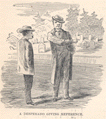 My idea, when I began this chapter, was to say
something about desperadoism in the "flush times" of Nevada.
To attempt a portrayal of that era and that land, and leave
out the blood and carnage, would be like portraying Mormondom
and leaving out polygamy. The desperado stalked the streets
with a swagger graded according to the number of his
homicides, and a nod of recognition from him was sufficient
to make a humble admirer happy for the rest of the day. The
deference that was paid to a desperado of wide reputation,
and who "kept his private graveyard," as the phrase went, was
marked, and cheerfully accorded. When he moved along the
sidewalk in his excessively long-tailed frock-coat, shiny
stump-toed boots, and with dainty little slouch hat tipped
over left eye, the small-fry roughs made room for his
majesty; when he entered the restaurant, the waiters deserted
bankers and merchants to overwhelm him with obsequious
service; when he shouldered his way to a bar, the shouldered
parties wheeled indignantly, recognized him, and--apologized.
They got a look in return that froze their marrow, and by
that time a curled and breast-pinned bar keeper was beaming
over the counter, proud of the established acquaintanceship
that permitted such a familiar form of speech as:
My idea, when I began this chapter, was to say
something about desperadoism in the "flush times" of Nevada.
To attempt a portrayal of that era and that land, and leave
out the blood and carnage, would be like portraying Mormondom
and leaving out polygamy. The desperado stalked the streets
with a swagger graded according to the number of his
homicides, and a nod of recognition from him was sufficient
to make a humble admirer happy for the rest of the day. The
deference that was paid to a desperado of wide reputation,
and who "kept his private graveyard," as the phrase went, was
marked, and cheerfully accorded. When he moved along the
sidewalk in his excessively long-tailed frock-coat, shiny
stump-toed boots, and with dainty little slouch hat tipped
over left eye, the small-fry roughs made room for his
majesty; when he entered the restaurant, the waiters deserted
bankers and merchants to overwhelm him with obsequious
service; when he shouldered his way to a bar, the shouldered
parties wheeled indignantly, recognized him, and--apologized.
They got a look in return that froze their marrow, and by
that time a curled and breast-pinned bar keeper was beaming
over the counter, proud of the established acquaintanceship
that permitted such a familiar form of speech as:"How're ye, Billy, old fel? Glad to see you. What'll you take--the old thing?"
The "old thing" meant his customary drink, of course.
The best known names in the Territory of Nevada were those belonging to these long-tailed heroes of the revolver. Orators, Governors, capitalists and leaders of the legislature enjoyed a degree of fame, but it seemed local and meagre when contrasted with the fame of such men as Sam Brown, Jack Williams, Billy Mulligan, Farmer Pease, Sugarfoot Mike, Pock Marked Jake, El Dorado Johnny, Jack McNabb, Joe McGee, Jack Harris, Six-fingered Pete, etc., etc. There was a long list of them. They were brave, reckless men, and traveled with their lives in their hands. To give them their due, they did their killing principally among themselves, and seldom molested peaceable citizens, for they considered it small credit to add to their trophies so cheap a bauble as the death of a man who was "not on the shoot," as they phrased it. They killed each other on slight provocation, and hoped and expected to be killed themselves--for they held it almost shame to die otherwise than "with their boots on," as they expressed it.
